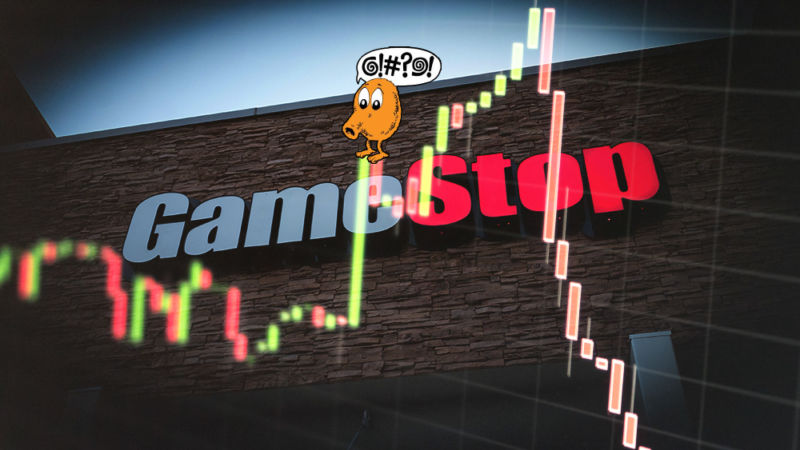to the moon —
Retail investors try to force another short squeeze as Cohen becomes chairman.
Kyle Orland
–

Enlarge / Q-Bert can’t tell what the @!#?! is going on with GameStop stock, either…
GameStop’s stock price is approaching the historic highs it reached during the zenith of its meme-stock volatility in January. The stock’s steady increase over the last months comes as the company prepares to announce its quarterly earnings after the market closed Wednesday evening. Shareholders, meanwhile, officially elected Chewy co-founder Ryan Cohen as chairman of the board.
As of Wednesday afternoon, GameStop stock is trading at around $325 per share, up nearly 10 percent from a Tuesday closing price of $300. That number is off slightly from the stock’s all-time high closing price of $347.51 on January 27 (though the stock spiked very briefly to an all-time high of $483 in intra-day trading on January 28). Today’s close could easily approach or surpass the January 29 closing price of $325, which was the stock’s second-highest point in history.
After the historic highs of January, GameStop stock plummeted to under $60 per share by the time February rolled around, and it sank as low as $40.59 by February 19, just after it was a central subject in a House Committee on Financial Services hearing. By early March, though, enthusiastic retail investors had once again bid the price up to around $260, after which it slowly sank back down to a recent minimum of $143.20 just a month ago.
GameStop’s business is still struggling
GameStop stock’s most recent rise comes ahead of this evening’s quarterly earnings report, during which the few analysts still tracking the highly volatile stock expect the company to announce its fourth operating loss in five quarters. But those same analysts say the expected quarterly loss of $67 million should be lower than it was a year ago ($98.8 million) amid what could be the company’s first year-over-year quarterly revenue gain in nearly three years.
In March, when GameStop announced worse-than-expected fiscal 2020 earnings, its stock price quickly dipped from $181.75 to $120.25, losing roughly a third of its value in a single day. But those who held onto the stock earned it all back—and more—the very next day, when the stock closed at $183.75 on March 25.
That should be ample evidence (as if more is needed) that GameStop’s stock price still has little if anything to do with the day-to-day fundamentals of its retail business. For context, when GameStop announced fiscal 2018 revenues of $8.3 billion in April 2019, its market cap was $1.3 billion, or about 15 percent of annual revenues. Today, that market cap is just over $22 billion, or roughly five times its fiscal 2020 revenues of $5.43 billion.
The fact that those depressed earnings officially ended the company’s 14-year run on the Fortune 500 doesn’t seem to have fazed retail investors. “As long as retail investors largely remain enthusiastic about GameStop’s prospects, however, the major question marks don’t matter much in terms of share price action,” Wedbush Morgan analyst Michael Pachter wrote in a recent note to investors, in which he set a $39 price target for the stock.
The future’s so bright… ?
So what is driving all the investor excitement, if not fundamental business success? Part of the movement is due to exuberance over Ryan Cohen, who is ascending to chairman of the company’s board of directors less than a year after he bought a 10 percent stake last August. Though Cohen’s new position atop the company’s board has been expected for months, it became official after a vote at a shareholder meeting today.
While Ryan has made vague gestures toward “building a powerful e-commerce platform that provides competitive pricing, broad gaming selection, fast shipping, and a truly high-touch experience that excites and delights customers,” he failed to outline any specific strategy for realizing that vision at today’s shareholder meeting.
“You won’t find us talking a big game, making a bunch of lofty promises, or telegraphing our strategy to the competition,” Cohen told the investors gathered in GameStop’s hometown of Grapevine, Texas (as reported by Bloomberg). “We’re fortunate to have such a special group of investors holding the company’s shares. You guys inspire us to think bigger, fight harder, and work longer each day. We have a lot of work in front of us. Moving forward, we want you to judge GameStop based on our actions, not our words.”
Enlarge / Some investors see newly named GameStop board chairman Ryan Cohen as the troubled company’s potential savior.
Management moves aside, the potential for a short squeeze is also playing into GameStop’s stock price, as was the case in January. Once again, many retail investors seem to be betting that pessimistic short sellers could be forced to purchase more shares or abandon their positions at a huge loss—if the stock price stays high enough for long enough.
Short interest in GameStop stock (i.e., the percent of all outstanding shares being borrowed for short selling) is currently hovering around 19 percent. That’s way down from the 141 percent at the height of the GameStop stock boom, when short shares were being reborrowed by other short sellers in a virtual frenzy that retail traders helped exploit. But the current short interest is still high enough that some stock-watchers think there’s potential for a squeeze that could drive the price even higher.
Whatever happens to GameStop as a stock in the medium term, GameStop as a company has already benefitted from the recent mania. The company recently banked $511 million by selling additional shares of stock to rabid investors. If anything, that should mean existing shares will be worth less, since they now represent a smaller slice of the company as a whole. But if that’s the case, no one has told the people continuing to buy GameStop stock at ever-higher prices.

